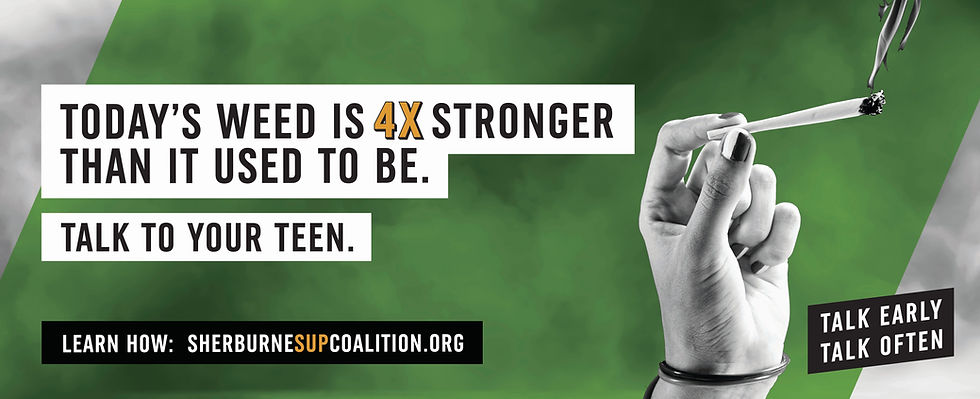Talk Early, Talk Often
- SUP Coalition
- Oct 1, 2018
- 2 min read

Do you recall seeing elements of the “Talk Early, Talk Often” campaign over the last couple of years? This campaign is organized by the SUP Coalition in an effort to help educate and empower parents and caregivers to have ongoing conversations with the young people in your lives around drugs and alcohol. Although the coalition wants adults to have conversations on all drugs, they are specifically working to create awareness of issues surrounding youth marijuana use and its adverse effects. Here are some key messages and talking points we have for parents/caregivers:
Marijuana is not a harmless drug for teens. The teen brain is still developing, and marijuana may cause abnormal brain development.
Marijuana is linked to school failure. Marijuana has a negative effect on attention, motivation, memory and learning.
Teens are at higher risk for addiction. The early use of marijuana is more likely to lead to addiction, compared to those who wait until they are adults. Teens that use marijuana regularly may also develop serious mental health disorders such as depression and psychosis.
Know the risks and teach your teens. The good news – when teens know how drugs can harm them, their use goes down. The bad news – fewer students see marijuana use as risky. According to the 2016 MN Student Survey, Sherburne students were least likely to believe that people put themselves at risk of harm by smoking marijuana.
Most teens are making healthy choices. Although teens think everyone is using marijuana, the fact is that most teens don’t. When teens know that not using marijuana is the norm, they are more likely to “fit in” with the crowd by not using it.
You are role models for your children, and actions speak louder than words. So if you use marijuana in front of your teens, they are more likely to use it themselves, regardless of whether you tell them not to.
You are the most powerful influence in your child’s life. Even when children reach their teen years, they still care about what parents say. If your teen knows you don’t approve of drug use, they won’t want to disappoint you.
Take action if you think your teen is using marijuana. There are numerous resources, many right in our community, where you can get information to help you talk to your children about drugs. Get contact information for local agencies at www.sherburnesupcoalition.org/community-guide.
Sources: American Family Physician; National Institute on Drug Abuse Marijuana use carries real risks for our youth, just as alcohol, tobacco, and other drugs do. Parents are the most powerful influence in a child’s life. Talk early and often about the risks, set clear rules against drug use, and enforce reasonable consequences for breaking the rules. Resources to help initiate and/or improve your conversations with the young people in your life are available at www.sherburnesupcoalition.org/talk-early-talk-often.






Comments